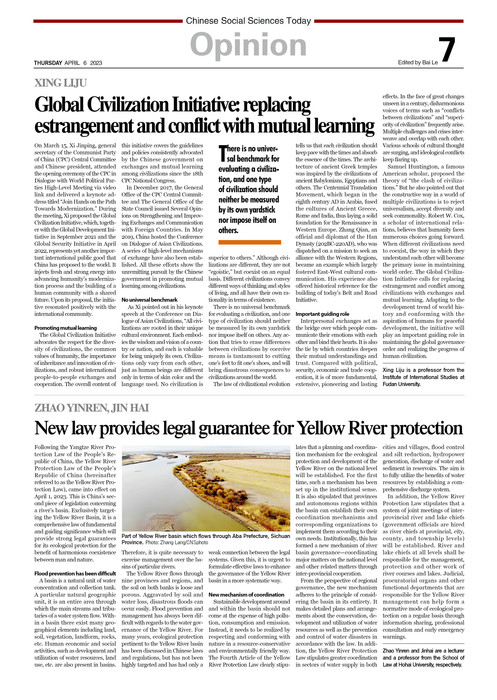Global Civilization Initiative: replacing estrangement and conflict with mutual learning
2023-04-06 14:21:15
On March 15, Xi Jinping, general secretary of the Communist Party of China (CPC) Central Committee and Chinese president, attended the opening ceremony of the CPC in Dialogue with World Political Parties High-Level Meeting via video link and delivered a keynote address titled “Join Hands on the Path Towards Modernization.” During the meeting, Xi proposed the Global Civilization Initiative, which, together with the Global Development Initiative in September 2021 and the Global Security Initiative in April 2022, represents yet another important international public good that China has proposed to the world. It injects fresh and strong energy into advancing humanity’s modernization process and the building of a human community with a shared future. Upon its proposal, the initiative resonated positively with the international community.
Promoting mutual learning
The Global Civilization Initiative advocates the respect for the diversity of civilizations, the common values of humanity, the importance of inheritance and innovation of civilizations, and robust international people-to-people exchanges and cooperation. The overall content of this initiative covers the guidelines and policies consistently advocated by the Chinese government on exchanges and mutual learning among civilizations since the 18th CPC National Congress.
In December 2017, the General Office of the CPC Central Committee and The General Office of the State Council issued Several Opinions on Strengthening and Improving Exchanges and Communication with Foreign Countries. In May 2019, China hosted the Conference on Dialogue of Asian Civilizations. A series of high-level mechanisms of exchange have also been established. All these efforts show the unremitting pursuit by the Chinese government in promoting mutual learning among civilizations.
No universal benchmark
As Xi pointed out in his keynote speech at the Conference on Dialogue of Asian Civilizations, “All civilizations are rooted in their unique cultural environment. Each embodies the wisdom and vision of a country or nation, and each is valuable for being uniquely its own. Civilizations only vary from each other, just as human beings are different only in terms of skin color and the language used. No civilization is superior to others.” Although civilizations are different, they are not “egoistic,” but coexist on an equal basis. Different civilizations convey different ways of thinking and styles of living, and all have their own rationality in terms of existence.
There is no universal benchmark for evaluating a civilization, and one type of civilization should neither be measured by its own yardstick nor impose itself on others. Any action that tries to erase differences between civilizations by coercive means is tantamount to cutting one’s feet to fit one’s shoes, and will bring disastrous consequences to civilizations around the world.
The law of civilizational evolution tells us that each civilization should keep pace with the times and absorb the essence of the times. The architecture of ancient Greek temples was inspired by the civilizations of ancient Babylonians, Egyptians and others. The Centennial Translation Movement, which began in the eighth century AD in Arabia, fused the cultures of Ancient Greece, Rome and India, thus laying a solid foundation for the Renaissance in Western Europe. Zhang Qian, an official and diplomat of the Han Dynasty (202BC-220AD), who was dispatched on a mission to seek an alliance with the Western Regions, became an example which largely fostered East-West cultural communication. His experience also offered historical reference for the building of today’s Belt and Road Initiative.
Important guiding role
Interpersonal exchanges act as the bridge over which people communicate their emotions with each other and bind their hearts. It is also the tie by which countries deepen their mutual understandings and trust. Compared with political, security, economic and trade cooperation, it is of more fundamental, extensive, pioneering and lasting effects. In the face of great changes unseen in a century, disharmonious voices of terms such as “conflicts between civilizations” and “superiority of civilization” frequently arise. Multiple challenges and crises interweave and overlap with each other. Various schools of cultural thought are surging, and ideological conflicts keep flaring up.
Samuel Huntington, a famous American scholar, proposed the theory of “the clash of civilizations.” But he also pointed out that the constructive way in a world of multiple civilizations is to reject universalism, accept diversity and seek commonality. Robert W. Cox, a scholar of international relations, believes that humanity faces numerous choices going forward. When different civilizations need to coexist, the way in which they understand each other will become the primary issue in maintaining world order. The Global Civilization Initiative calls for replacing estrangement and conflict among civilizations with exchanges and mutual learning. Adapting to the development trend of world history and conforming with the aspiration of humans for peaceful development, the initiative will play an important guiding role in maintaining the global governance order and realizing the progress of human civilization.
Xing Liju is a professor from the Institute of International Studies at Fudan University.


